Analysing Professional Development in the Hospitality Industry
VerifiedAdded on 2021/02/19
|13
|3999
|18
Report
AI Summary
This report examines professional identity and practice within the context of the Four Seasons Hotel in London, focusing on the benefits of professional development for various stakeholders, including employees and the organization. It analyzes employer expectations regarding skills and competencies, particularly in customer-facing roles, highlighting the importance of optimistic behavior and problem-solving abilities. The report evaluates the author's own skills and competencies for a customer executive role, using a skill audit to identify strengths and weaknesses, and discusses relevant learning theories such as cognitive, social learning, humanistic, and behaviorist approaches. Furthermore, it outlines a development plan to enhance chosen skills and competencies, and provides a job interview analysis, including strengths and weaknesses of the process. The report concludes by emphasizing the significance of continuous professional development in the hospitality industry to maintain a competitive edge, enhance customer satisfaction, and improve employee retention.
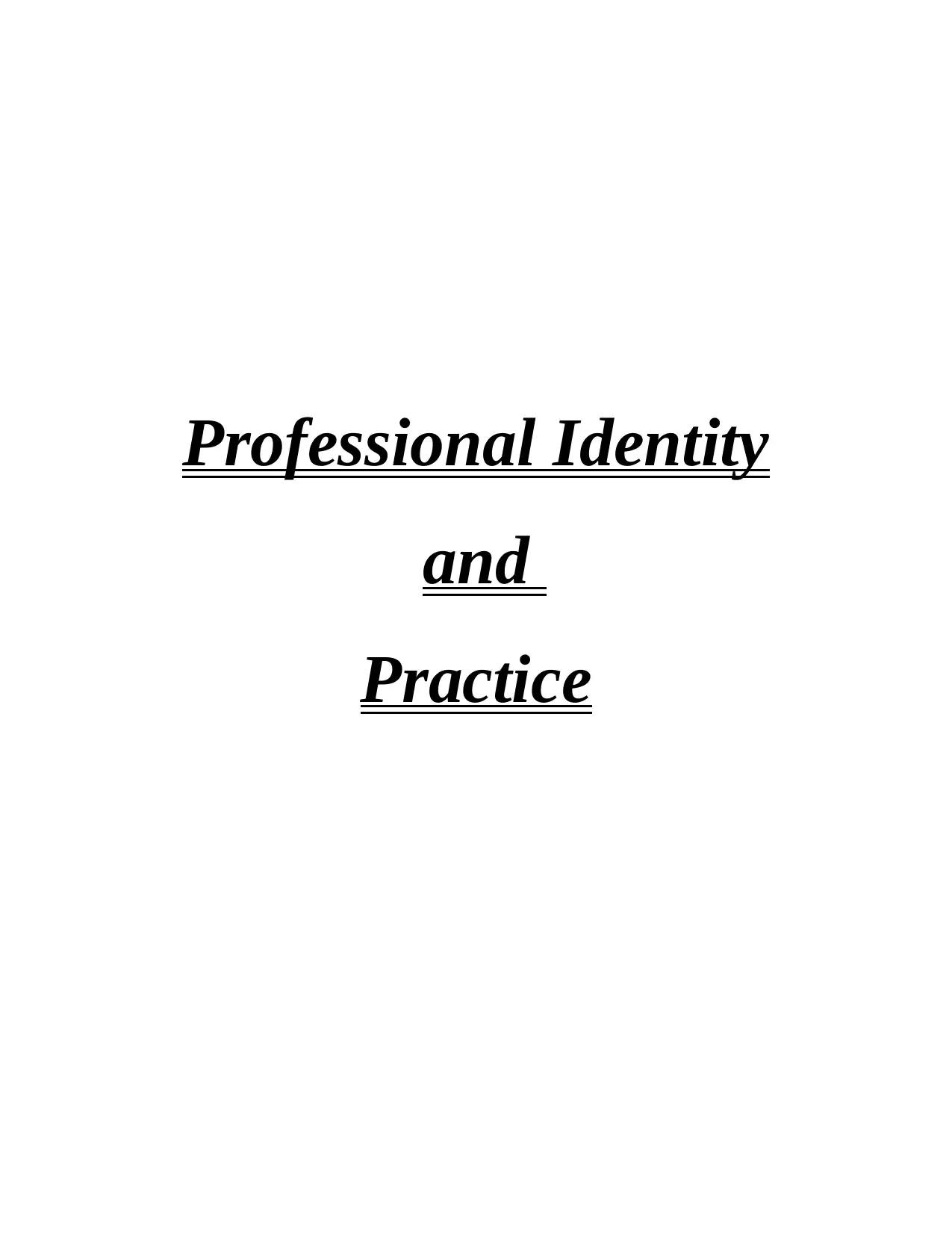
Professional Identity
and
Practice
and
Practice
Paraphrase This Document
Need a fresh take? Get an instant paraphrase of this document with our AI Paraphraser
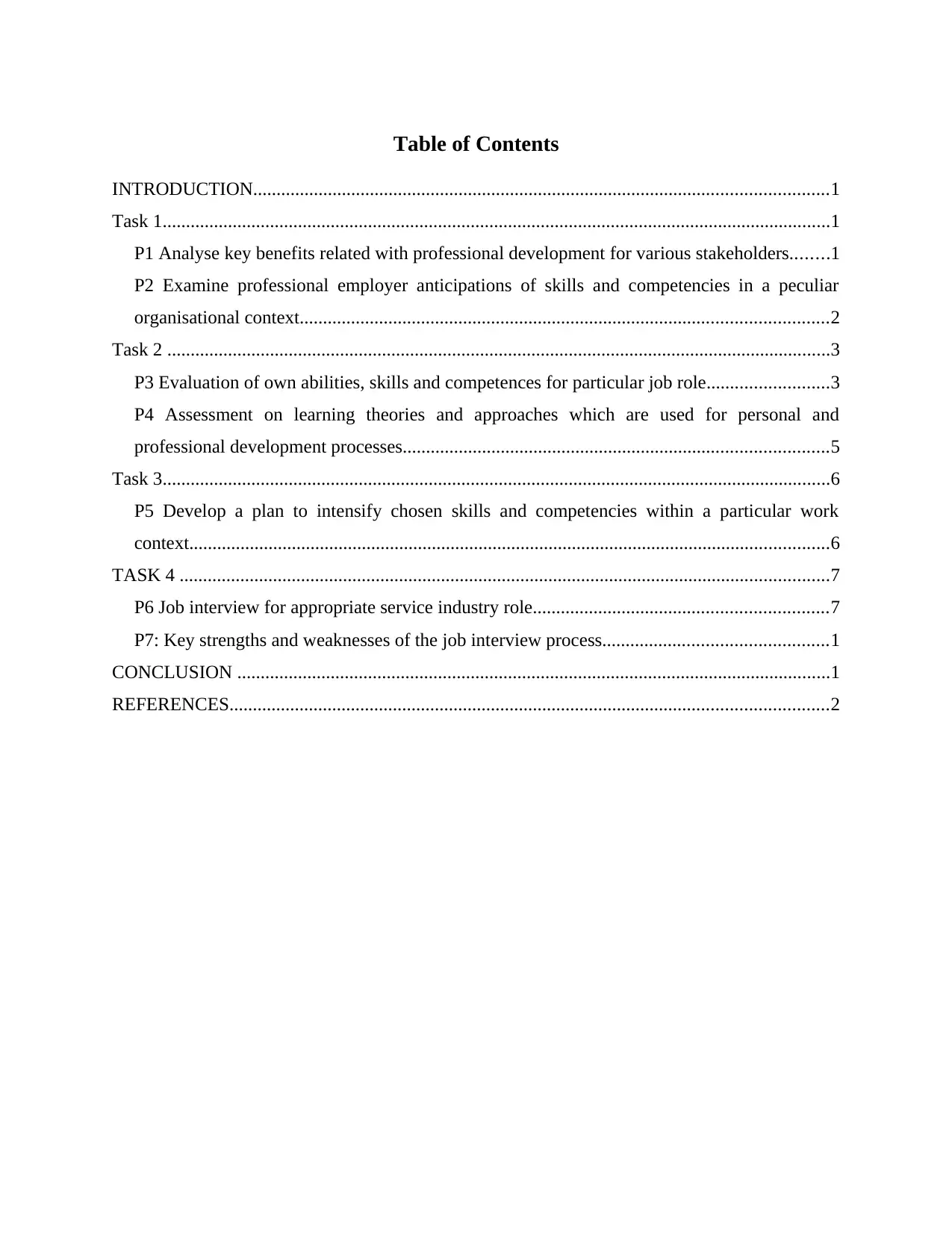
Table of Contents
INTRODUCTION...........................................................................................................................1
Task 1...............................................................................................................................................1
P1 Analyse key benefits related with professional development for various stakeholders........1
P2 Examine professional employer anticipations of skills and competencies in a peculiar
organisational context.................................................................................................................2
Task 2 ..............................................................................................................................................3
P3 Evaluation of own abilities, skills and competences for particular job role..........................3
P4 Assessment on learning theories and approaches which are used for personal and
professional development processes...........................................................................................5
Task 3...............................................................................................................................................6
P5 Develop a plan to intensify chosen skills and competencies within a particular work
context.........................................................................................................................................6
TASK 4 ...........................................................................................................................................7
P6 Job interview for appropriate service industry role...............................................................7
P7: Key strengths and weaknesses of the job interview process................................................1
CONCLUSION ...............................................................................................................................1
REFERENCES................................................................................................................................2
INTRODUCTION...........................................................................................................................1
Task 1...............................................................................................................................................1
P1 Analyse key benefits related with professional development for various stakeholders........1
P2 Examine professional employer anticipations of skills and competencies in a peculiar
organisational context.................................................................................................................2
Task 2 ..............................................................................................................................................3
P3 Evaluation of own abilities, skills and competences for particular job role..........................3
P4 Assessment on learning theories and approaches which are used for personal and
professional development processes...........................................................................................5
Task 3...............................................................................................................................................6
P5 Develop a plan to intensify chosen skills and competencies within a particular work
context.........................................................................................................................................6
TASK 4 ...........................................................................................................................................7
P6 Job interview for appropriate service industry role...............................................................7
P7: Key strengths and weaknesses of the job interview process................................................1
CONCLUSION ...............................................................................................................................1
REFERENCES................................................................................................................................2
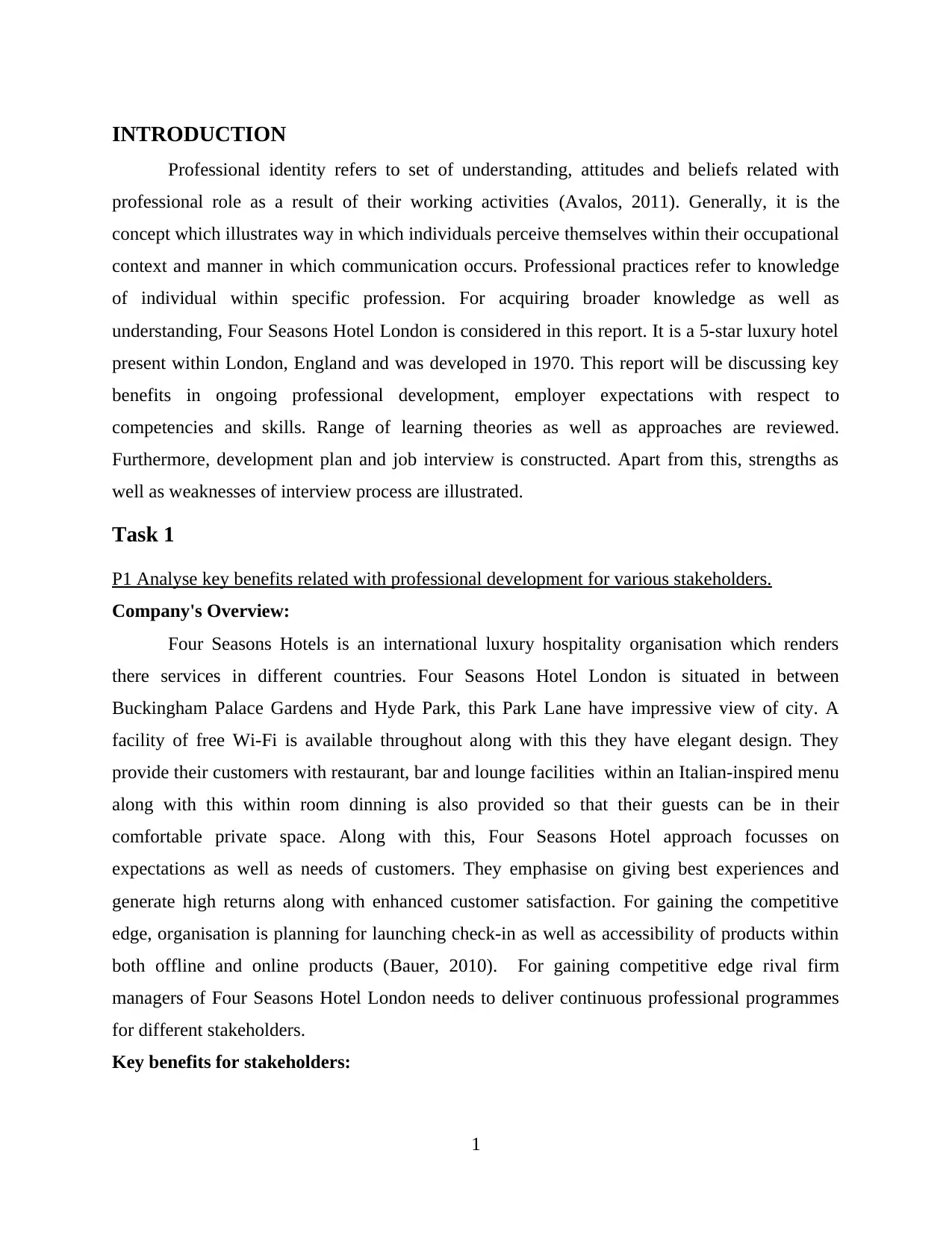
INTRODUCTION
Professional identity refers to set of understanding, attitudes and beliefs related with
professional role as a result of their working activities (Avalos, 2011). Generally, it is the
concept which illustrates way in which individuals perceive themselves within their occupational
context and manner in which communication occurs. Professional practices refer to knowledge
of individual within specific profession. For acquiring broader knowledge as well as
understanding, Four Seasons Hotel London is considered in this report. It is a 5-star luxury hotel
present within London, England and was developed in 1970. This report will be discussing key
benefits in ongoing professional development, employer expectations with respect to
competencies and skills. Range of learning theories as well as approaches are reviewed.
Furthermore, development plan and job interview is constructed. Apart from this, strengths as
well as weaknesses of interview process are illustrated.
Task 1
P1 Analyse key benefits related with professional development for various stakeholders.
Company's Overview:
Four Seasons Hotels is an international luxury hospitality organisation which renders
there services in different countries. Four Seasons Hotel London is situated in between
Buckingham Palace Gardens and Hyde Park, this Park Lane have impressive view of city. A
facility of free Wi-Fi is available throughout along with this they have elegant design. They
provide their customers with restaurant, bar and lounge facilities within an Italian-inspired menu
along with this within room dinning is also provided so that their guests can be in their
comfortable private space. Along with this, Four Seasons Hotel approach focusses on
expectations as well as needs of customers. They emphasise on giving best experiences and
generate high returns along with enhanced customer satisfaction. For gaining the competitive
edge, organisation is planning for launching check-in as well as accessibility of products within
both offline and online products (Bauer, 2010). For gaining competitive edge rival firm
managers of Four Seasons Hotel London needs to deliver continuous professional programmes
for different stakeholders.
Key benefits for stakeholders:
1
Professional identity refers to set of understanding, attitudes and beliefs related with
professional role as a result of their working activities (Avalos, 2011). Generally, it is the
concept which illustrates way in which individuals perceive themselves within their occupational
context and manner in which communication occurs. Professional practices refer to knowledge
of individual within specific profession. For acquiring broader knowledge as well as
understanding, Four Seasons Hotel London is considered in this report. It is a 5-star luxury hotel
present within London, England and was developed in 1970. This report will be discussing key
benefits in ongoing professional development, employer expectations with respect to
competencies and skills. Range of learning theories as well as approaches are reviewed.
Furthermore, development plan and job interview is constructed. Apart from this, strengths as
well as weaknesses of interview process are illustrated.
Task 1
P1 Analyse key benefits related with professional development for various stakeholders.
Company's Overview:
Four Seasons Hotels is an international luxury hospitality organisation which renders
there services in different countries. Four Seasons Hotel London is situated in between
Buckingham Palace Gardens and Hyde Park, this Park Lane have impressive view of city. A
facility of free Wi-Fi is available throughout along with this they have elegant design. They
provide their customers with restaurant, bar and lounge facilities within an Italian-inspired menu
along with this within room dinning is also provided so that their guests can be in their
comfortable private space. Along with this, Four Seasons Hotel approach focusses on
expectations as well as needs of customers. They emphasise on giving best experiences and
generate high returns along with enhanced customer satisfaction. For gaining the competitive
edge, organisation is planning for launching check-in as well as accessibility of products within
both offline and online products (Bauer, 2010). For gaining competitive edge rival firm
managers of Four Seasons Hotel London needs to deliver continuous professional programmes
for different stakeholders.
Key benefits for stakeholders:
1
⊘ This is a preview!⊘
Do you want full access?
Subscribe today to unlock all pages.

Trusted by 1+ million students worldwide
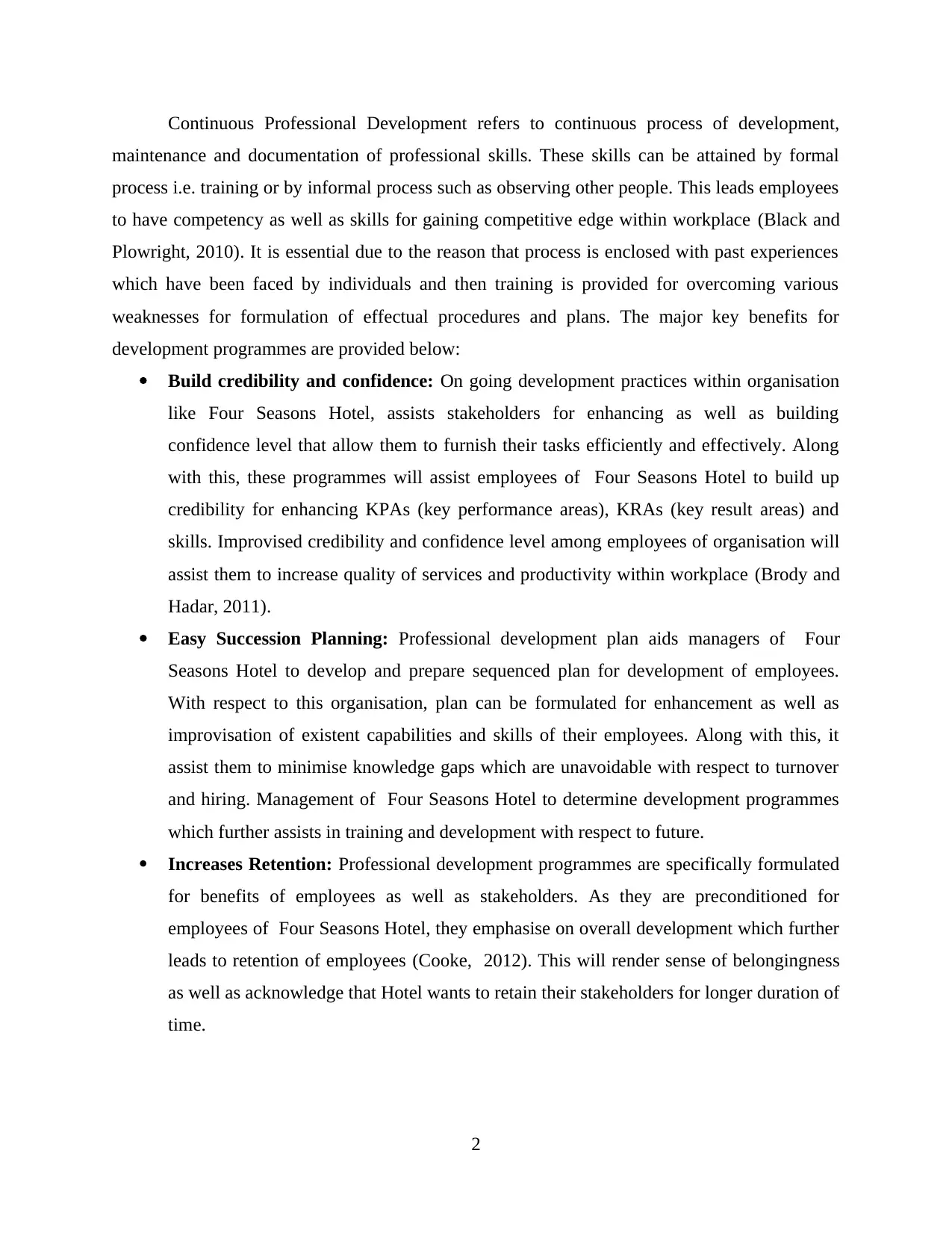
Continuous Professional Development refers to continuous process of development,
maintenance and documentation of professional skills. These skills can be attained by formal
process i.e. training or by informal process such as observing other people. This leads employees
to have competency as well as skills for gaining competitive edge within workplace (Black and
Plowright, 2010). It is essential due to the reason that process is enclosed with past experiences
which have been faced by individuals and then training is provided for overcoming various
weaknesses for formulation of effectual procedures and plans. The major key benefits for
development programmes are provided below:
Build credibility and confidence: On going development practices within organisation
like Four Seasons Hotel, assists stakeholders for enhancing as well as building
confidence level that allow them to furnish their tasks efficiently and effectively. Along
with this, these programmes will assist employees of Four Seasons Hotel to build up
credibility for enhancing KPAs (key performance areas), KRAs (key result areas) and
skills. Improvised credibility and confidence level among employees of organisation will
assist them to increase quality of services and productivity within workplace (Brody and
Hadar, 2011).
Easy Succession Planning: Professional development plan aids managers of Four
Seasons Hotel to develop and prepare sequenced plan for development of employees.
With respect to this organisation, plan can be formulated for enhancement as well as
improvisation of existent capabilities and skills of their employees. Along with this, it
assist them to minimise knowledge gaps which are unavoidable with respect to turnover
and hiring. Management of Four Seasons Hotel to determine development programmes
which further assists in training and development with respect to future.
Increases Retention: Professional development programmes are specifically formulated
for benefits of employees as well as stakeholders. As they are preconditioned for
employees of Four Seasons Hotel, they emphasise on overall development which further
leads to retention of employees (Cooke, 2012). This will render sense of belongingness
as well as acknowledge that Hotel wants to retain their stakeholders for longer duration of
time.
2
maintenance and documentation of professional skills. These skills can be attained by formal
process i.e. training or by informal process such as observing other people. This leads employees
to have competency as well as skills for gaining competitive edge within workplace (Black and
Plowright, 2010). It is essential due to the reason that process is enclosed with past experiences
which have been faced by individuals and then training is provided for overcoming various
weaknesses for formulation of effectual procedures and plans. The major key benefits for
development programmes are provided below:
Build credibility and confidence: On going development practices within organisation
like Four Seasons Hotel, assists stakeholders for enhancing as well as building
confidence level that allow them to furnish their tasks efficiently and effectively. Along
with this, these programmes will assist employees of Four Seasons Hotel to build up
credibility for enhancing KPAs (key performance areas), KRAs (key result areas) and
skills. Improvised credibility and confidence level among employees of organisation will
assist them to increase quality of services and productivity within workplace (Brody and
Hadar, 2011).
Easy Succession Planning: Professional development plan aids managers of Four
Seasons Hotel to develop and prepare sequenced plan for development of employees.
With respect to this organisation, plan can be formulated for enhancement as well as
improvisation of existent capabilities and skills of their employees. Along with this, it
assist them to minimise knowledge gaps which are unavoidable with respect to turnover
and hiring. Management of Four Seasons Hotel to determine development programmes
which further assists in training and development with respect to future.
Increases Retention: Professional development programmes are specifically formulated
for benefits of employees as well as stakeholders. As they are preconditioned for
employees of Four Seasons Hotel, they emphasise on overall development which further
leads to retention of employees (Cooke, 2012). This will render sense of belongingness
as well as acknowledge that Hotel wants to retain their stakeholders for longer duration of
time.
2
Paraphrase This Document
Need a fresh take? Get an instant paraphrase of this document with our AI Paraphraser
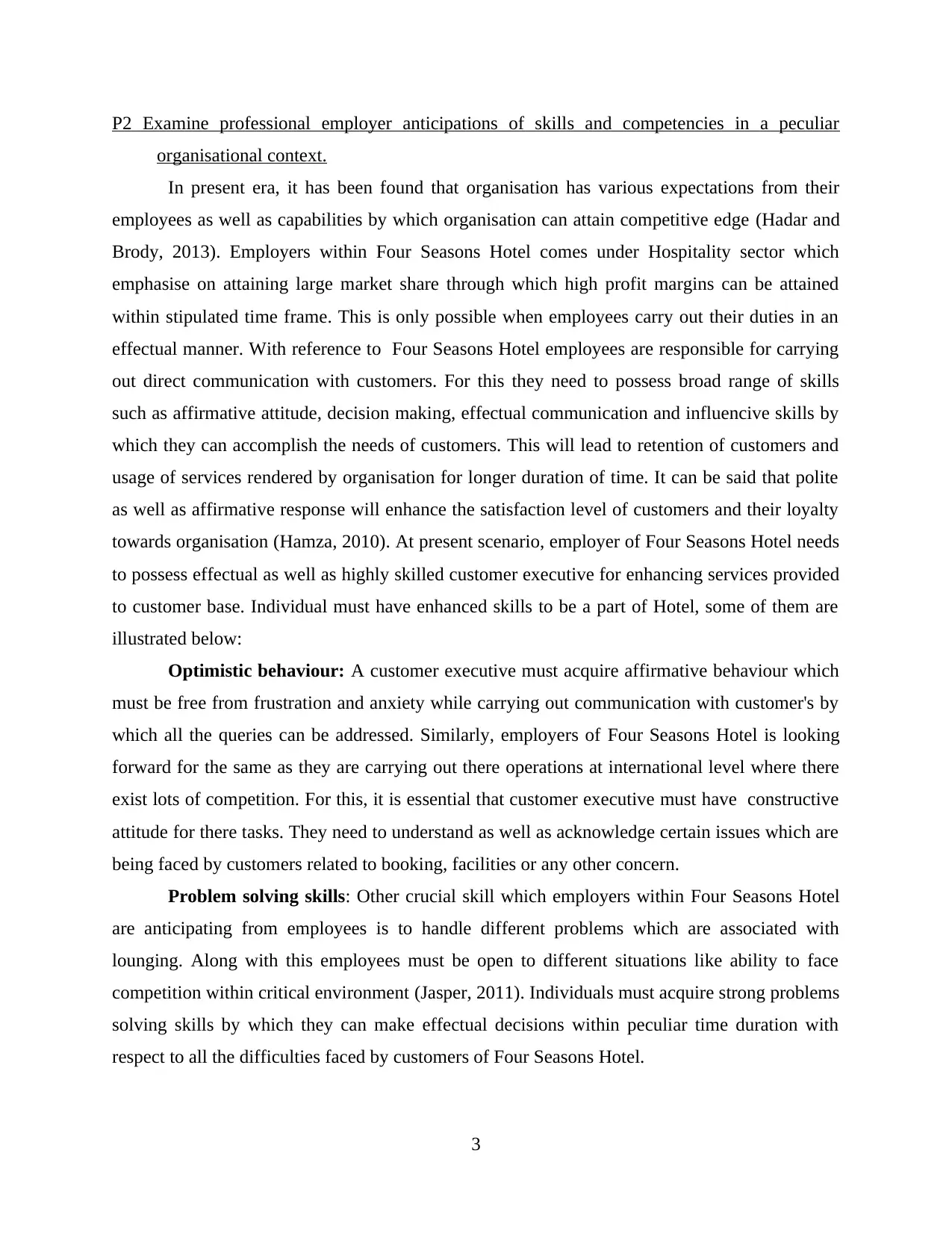
P2 Examine professional employer anticipations of skills and competencies in a peculiar
organisational context.
In present era, it has been found that organisation has various expectations from their
employees as well as capabilities by which organisation can attain competitive edge (Hadar and
Brody, 2013). Employers within Four Seasons Hotel comes under Hospitality sector which
emphasise on attaining large market share through which high profit margins can be attained
within stipulated time frame. This is only possible when employees carry out their duties in an
effectual manner. With reference to Four Seasons Hotel employees are responsible for carrying
out direct communication with customers. For this they need to possess broad range of skills
such as affirmative attitude, decision making, effectual communication and influencive skills by
which they can accomplish the needs of customers. This will lead to retention of customers and
usage of services rendered by organisation for longer duration of time. It can be said that polite
as well as affirmative response will enhance the satisfaction level of customers and their loyalty
towards organisation (Hamza, 2010). At present scenario, employer of Four Seasons Hotel needs
to possess effectual as well as highly skilled customer executive for enhancing services provided
to customer base. Individual must have enhanced skills to be a part of Hotel, some of them are
illustrated below:
Optimistic behaviour: A customer executive must acquire affirmative behaviour which
must be free from frustration and anxiety while carrying out communication with customer's by
which all the queries can be addressed. Similarly, employers of Four Seasons Hotel is looking
forward for the same as they are carrying out there operations at international level where there
exist lots of competition. For this, it is essential that customer executive must have constructive
attitude for there tasks. They need to understand as well as acknowledge certain issues which are
being faced by customers related to booking, facilities or any other concern.
Problem solving skills: Other crucial skill which employers within Four Seasons Hotel
are anticipating from employees is to handle different problems which are associated with
lounging. Along with this employees must be open to different situations like ability to face
competition within critical environment (Jasper, 2011). Individuals must acquire strong problems
solving skills by which they can make effectual decisions within peculiar time duration with
respect to all the difficulties faced by customers of Four Seasons Hotel.
3
organisational context.
In present era, it has been found that organisation has various expectations from their
employees as well as capabilities by which organisation can attain competitive edge (Hadar and
Brody, 2013). Employers within Four Seasons Hotel comes under Hospitality sector which
emphasise on attaining large market share through which high profit margins can be attained
within stipulated time frame. This is only possible when employees carry out their duties in an
effectual manner. With reference to Four Seasons Hotel employees are responsible for carrying
out direct communication with customers. For this they need to possess broad range of skills
such as affirmative attitude, decision making, effectual communication and influencive skills by
which they can accomplish the needs of customers. This will lead to retention of customers and
usage of services rendered by organisation for longer duration of time. It can be said that polite
as well as affirmative response will enhance the satisfaction level of customers and their loyalty
towards organisation (Hamza, 2010). At present scenario, employer of Four Seasons Hotel needs
to possess effectual as well as highly skilled customer executive for enhancing services provided
to customer base. Individual must have enhanced skills to be a part of Hotel, some of them are
illustrated below:
Optimistic behaviour: A customer executive must acquire affirmative behaviour which
must be free from frustration and anxiety while carrying out communication with customer's by
which all the queries can be addressed. Similarly, employers of Four Seasons Hotel is looking
forward for the same as they are carrying out there operations at international level where there
exist lots of competition. For this, it is essential that customer executive must have constructive
attitude for there tasks. They need to understand as well as acknowledge certain issues which are
being faced by customers related to booking, facilities or any other concern.
Problem solving skills: Other crucial skill which employers within Four Seasons Hotel
are anticipating from employees is to handle different problems which are associated with
lounging. Along with this employees must be open to different situations like ability to face
competition within critical environment (Jasper, 2011). Individuals must acquire strong problems
solving skills by which they can make effectual decisions within peculiar time duration with
respect to all the difficulties faced by customers of Four Seasons Hotel.
3
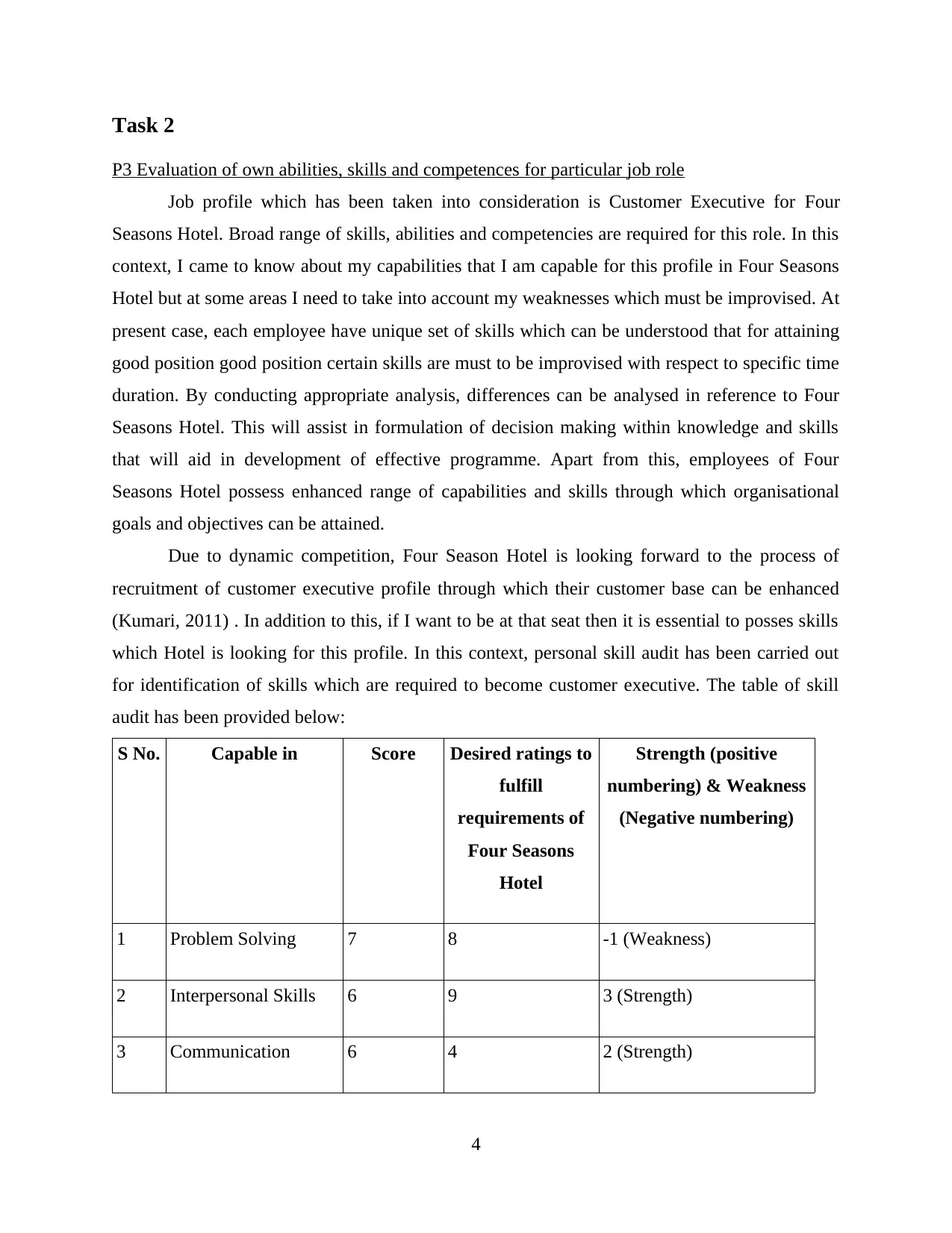
Task 2
P3 Evaluation of own abilities, skills and competences for particular job role
Job profile which has been taken into consideration is Customer Executive for Four
Seasons Hotel. Broad range of skills, abilities and competencies are required for this role. In this
context, I came to know about my capabilities that I am capable for this profile in Four Seasons
Hotel but at some areas I need to take into account my weaknesses which must be improvised. At
present case, each employee have unique set of skills which can be understood that for attaining
good position good position certain skills are must to be improvised with respect to specific time
duration. By conducting appropriate analysis, differences can be analysed in reference to Four
Seasons Hotel. This will assist in formulation of decision making within knowledge and skills
that will aid in development of effective programme. Apart from this, employees of Four
Seasons Hotel possess enhanced range of capabilities and skills through which organisational
goals and objectives can be attained.
Due to dynamic competition, Four Season Hotel is looking forward to the process of
recruitment of customer executive profile through which their customer base can be enhanced
(Kumari, 2011) . In addition to this, if I want to be at that seat then it is essential to posses skills
which Hotel is looking for this profile. In this context, personal skill audit has been carried out
for identification of skills which are required to become customer executive. The table of skill
audit has been provided below:
S No. Capable in Score Desired ratings to
fulfill
requirements of
Four Seasons
Hotel
Strength (positive
numbering) & Weakness
(Negative numbering)
1 Problem Solving 7 8 -1 (Weakness)
2 Interpersonal Skills 6 9 3 (Strength)
3 Communication 6 4 2 (Strength)
4
P3 Evaluation of own abilities, skills and competences for particular job role
Job profile which has been taken into consideration is Customer Executive for Four
Seasons Hotel. Broad range of skills, abilities and competencies are required for this role. In this
context, I came to know about my capabilities that I am capable for this profile in Four Seasons
Hotel but at some areas I need to take into account my weaknesses which must be improvised. At
present case, each employee have unique set of skills which can be understood that for attaining
good position good position certain skills are must to be improvised with respect to specific time
duration. By conducting appropriate analysis, differences can be analysed in reference to Four
Seasons Hotel. This will assist in formulation of decision making within knowledge and skills
that will aid in development of effective programme. Apart from this, employees of Four
Seasons Hotel possess enhanced range of capabilities and skills through which organisational
goals and objectives can be attained.
Due to dynamic competition, Four Season Hotel is looking forward to the process of
recruitment of customer executive profile through which their customer base can be enhanced
(Kumari, 2011) . In addition to this, if I want to be at that seat then it is essential to posses skills
which Hotel is looking for this profile. In this context, personal skill audit has been carried out
for identification of skills which are required to become customer executive. The table of skill
audit has been provided below:
S No. Capable in Score Desired ratings to
fulfill
requirements of
Four Seasons
Hotel
Strength (positive
numbering) & Weakness
(Negative numbering)
1 Problem Solving 7 8 -1 (Weakness)
2 Interpersonal Skills 6 9 3 (Strength)
3 Communication 6 4 2 (Strength)
4
⊘ This is a preview!⊘
Do you want full access?
Subscribe today to unlock all pages.

Trusted by 1+ million students worldwide
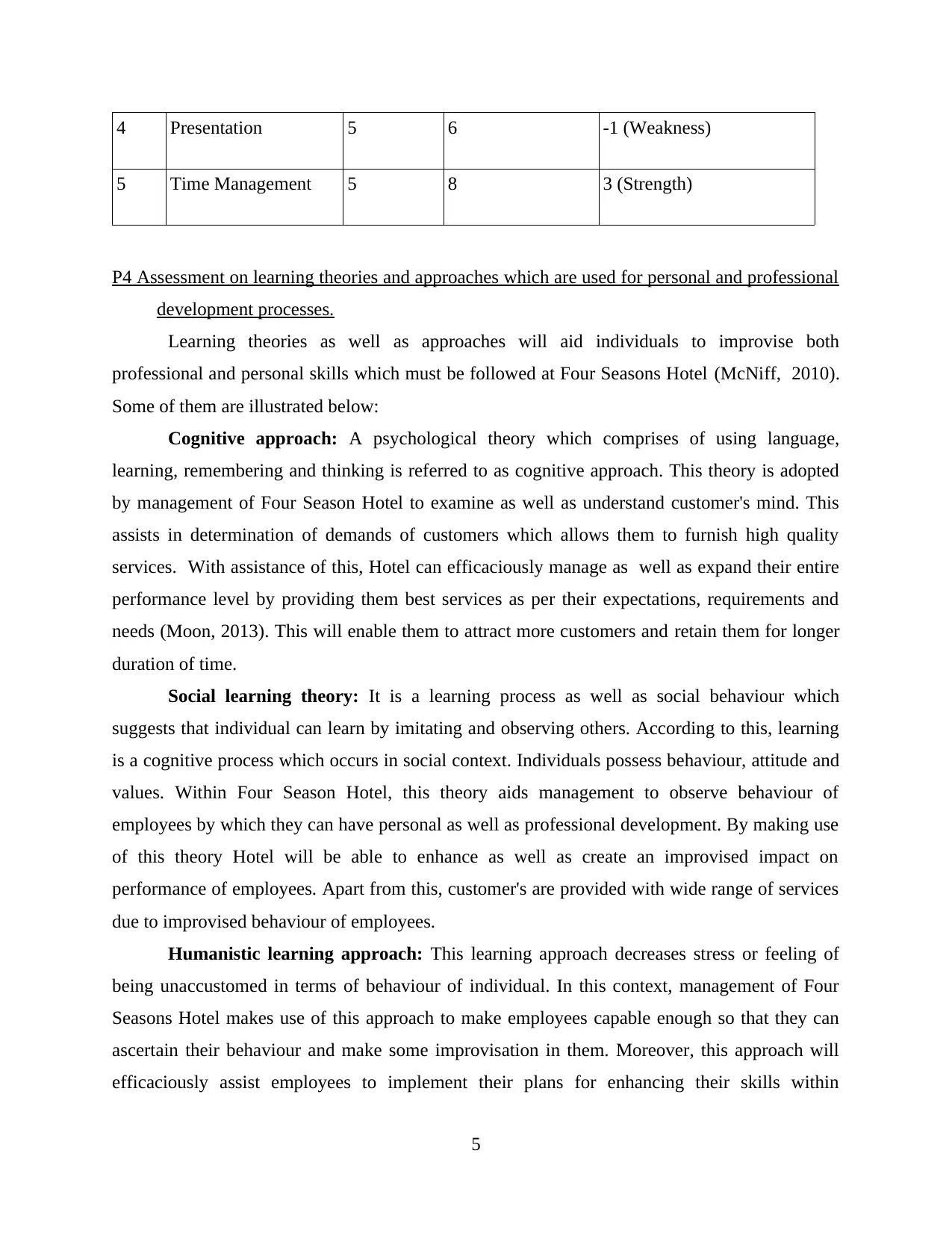
4 Presentation 5 6 -1 (Weakness)
5 Time Management 5 8 3 (Strength)
P4 Assessment on learning theories and approaches which are used for personal and professional
development processes.
Learning theories as well as approaches will aid individuals to improvise both
professional and personal skills which must be followed at Four Seasons Hotel (McNiff, 2010).
Some of them are illustrated below:
Cognitive approach: A psychological theory which comprises of using language,
learning, remembering and thinking is referred to as cognitive approach. This theory is adopted
by management of Four Season Hotel to examine as well as understand customer's mind. This
assists in determination of demands of customers which allows them to furnish high quality
services. With assistance of this, Hotel can efficaciously manage as well as expand their entire
performance level by providing them best services as per their expectations, requirements and
needs (Moon, 2013). This will enable them to attract more customers and retain them for longer
duration of time.
Social learning theory: It is a learning process as well as social behaviour which
suggests that individual can learn by imitating and observing others. According to this, learning
is a cognitive process which occurs in social context. Individuals possess behaviour, attitude and
values. Within Four Season Hotel, this theory aids management to observe behaviour of
employees by which they can have personal as well as professional development. By making use
of this theory Hotel will be able to enhance as well as create an improvised impact on
performance of employees. Apart from this, customer's are provided with wide range of services
due to improvised behaviour of employees.
Humanistic learning approach: This learning approach decreases stress or feeling of
being unaccustomed in terms of behaviour of individual. In this context, management of Four
Seasons Hotel makes use of this approach to make employees capable enough so that they can
ascertain their behaviour and make some improvisation in them. Moreover, this approach will
efficaciously assist employees to implement their plans for enhancing their skills within
5
5 Time Management 5 8 3 (Strength)
P4 Assessment on learning theories and approaches which are used for personal and professional
development processes.
Learning theories as well as approaches will aid individuals to improvise both
professional and personal skills which must be followed at Four Seasons Hotel (McNiff, 2010).
Some of them are illustrated below:
Cognitive approach: A psychological theory which comprises of using language,
learning, remembering and thinking is referred to as cognitive approach. This theory is adopted
by management of Four Season Hotel to examine as well as understand customer's mind. This
assists in determination of demands of customers which allows them to furnish high quality
services. With assistance of this, Hotel can efficaciously manage as well as expand their entire
performance level by providing them best services as per their expectations, requirements and
needs (Moon, 2013). This will enable them to attract more customers and retain them for longer
duration of time.
Social learning theory: It is a learning process as well as social behaviour which
suggests that individual can learn by imitating and observing others. According to this, learning
is a cognitive process which occurs in social context. Individuals possess behaviour, attitude and
values. Within Four Season Hotel, this theory aids management to observe behaviour of
employees by which they can have personal as well as professional development. By making use
of this theory Hotel will be able to enhance as well as create an improvised impact on
performance of employees. Apart from this, customer's are provided with wide range of services
due to improvised behaviour of employees.
Humanistic learning approach: This learning approach decreases stress or feeling of
being unaccustomed in terms of behaviour of individual. In this context, management of Four
Seasons Hotel makes use of this approach to make employees capable enough so that they can
ascertain their behaviour and make some improvisation in them. Moreover, this approach will
efficaciously assist employees to implement their plans for enhancing their skills within
5
Paraphrase This Document
Need a fresh take? Get an instant paraphrase of this document with our AI Paraphraser
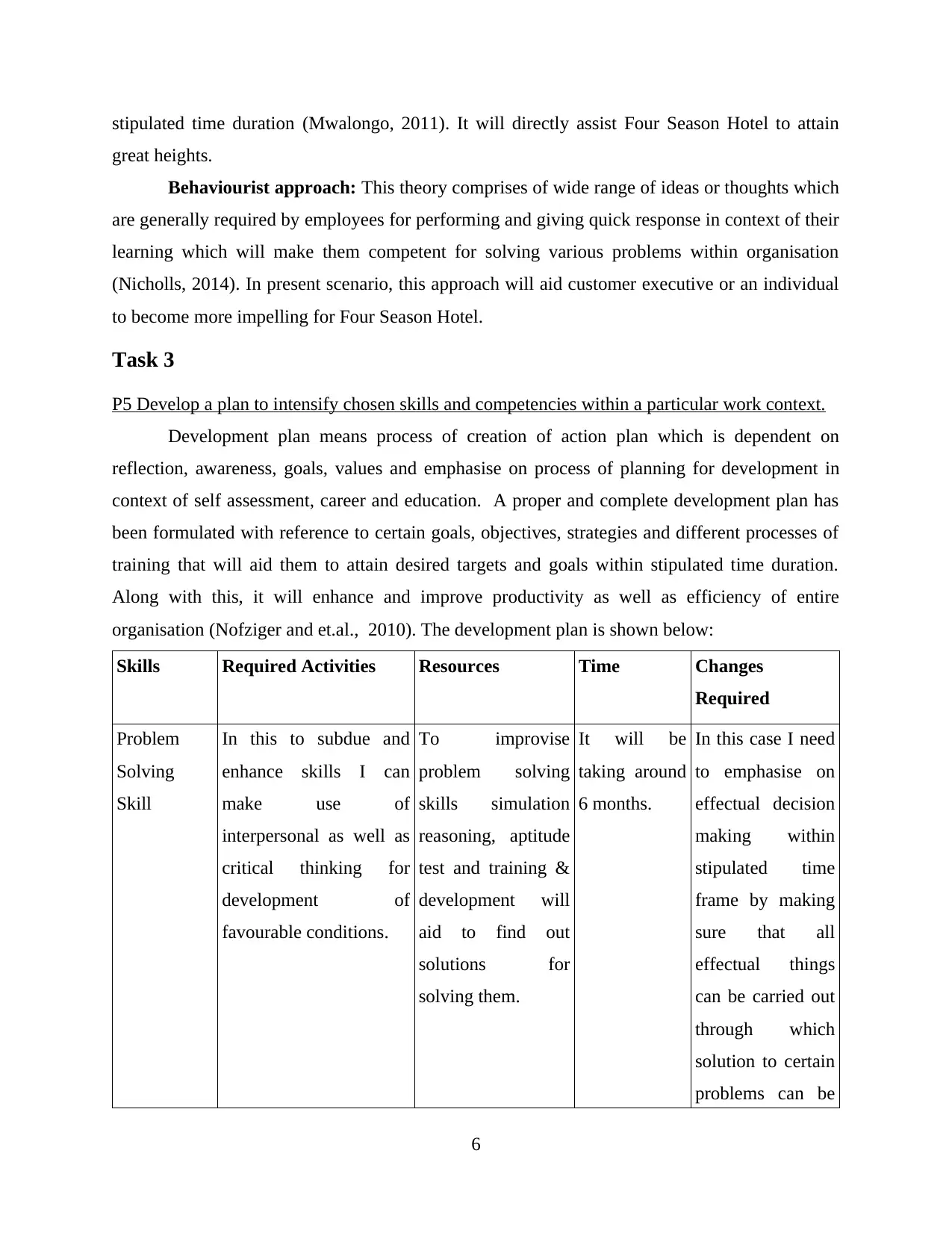
stipulated time duration (Mwalongo, 2011). It will directly assist Four Season Hotel to attain
great heights.
Behaviourist approach: This theory comprises of wide range of ideas or thoughts which
are generally required by employees for performing and giving quick response in context of their
learning which will make them competent for solving various problems within organisation
(Nicholls, 2014). In present scenario, this approach will aid customer executive or an individual
to become more impelling for Four Season Hotel.
Task 3
P5 Develop a plan to intensify chosen skills and competencies within a particular work context.
Development plan means process of creation of action plan which is dependent on
reflection, awareness, goals, values and emphasise on process of planning for development in
context of self assessment, career and education. A proper and complete development plan has
been formulated with reference to certain goals, objectives, strategies and different processes of
training that will aid them to attain desired targets and goals within stipulated time duration.
Along with this, it will enhance and improve productivity as well as efficiency of entire
organisation (Nofziger and et.al., 2010). The development plan is shown below:
Skills Required Activities Resources Time Changes
Required
Problem
Solving
Skill
In this to subdue and
enhance skills I can
make use of
interpersonal as well as
critical thinking for
development of
favourable conditions.
To improvise
problem solving
skills simulation
reasoning, aptitude
test and training &
development will
aid to find out
solutions for
solving them.
It will be
taking around
6 months.
In this case I need
to emphasise on
effectual decision
making within
stipulated time
frame by making
sure that all
effectual things
can be carried out
through which
solution to certain
problems can be
6
great heights.
Behaviourist approach: This theory comprises of wide range of ideas or thoughts which
are generally required by employees for performing and giving quick response in context of their
learning which will make them competent for solving various problems within organisation
(Nicholls, 2014). In present scenario, this approach will aid customer executive or an individual
to become more impelling for Four Season Hotel.
Task 3
P5 Develop a plan to intensify chosen skills and competencies within a particular work context.
Development plan means process of creation of action plan which is dependent on
reflection, awareness, goals, values and emphasise on process of planning for development in
context of self assessment, career and education. A proper and complete development plan has
been formulated with reference to certain goals, objectives, strategies and different processes of
training that will aid them to attain desired targets and goals within stipulated time duration.
Along with this, it will enhance and improve productivity as well as efficiency of entire
organisation (Nofziger and et.al., 2010). The development plan is shown below:
Skills Required Activities Resources Time Changes
Required
Problem
Solving
Skill
In this to subdue and
enhance skills I can
make use of
interpersonal as well as
critical thinking for
development of
favourable conditions.
To improvise
problem solving
skills simulation
reasoning, aptitude
test and training &
development will
aid to find out
solutions for
solving them.
It will be
taking around
6 months.
In this case I need
to emphasise on
effectual decision
making within
stipulated time
frame by making
sure that all
effectual things
can be carried out
through which
solution to certain
problems can be
6
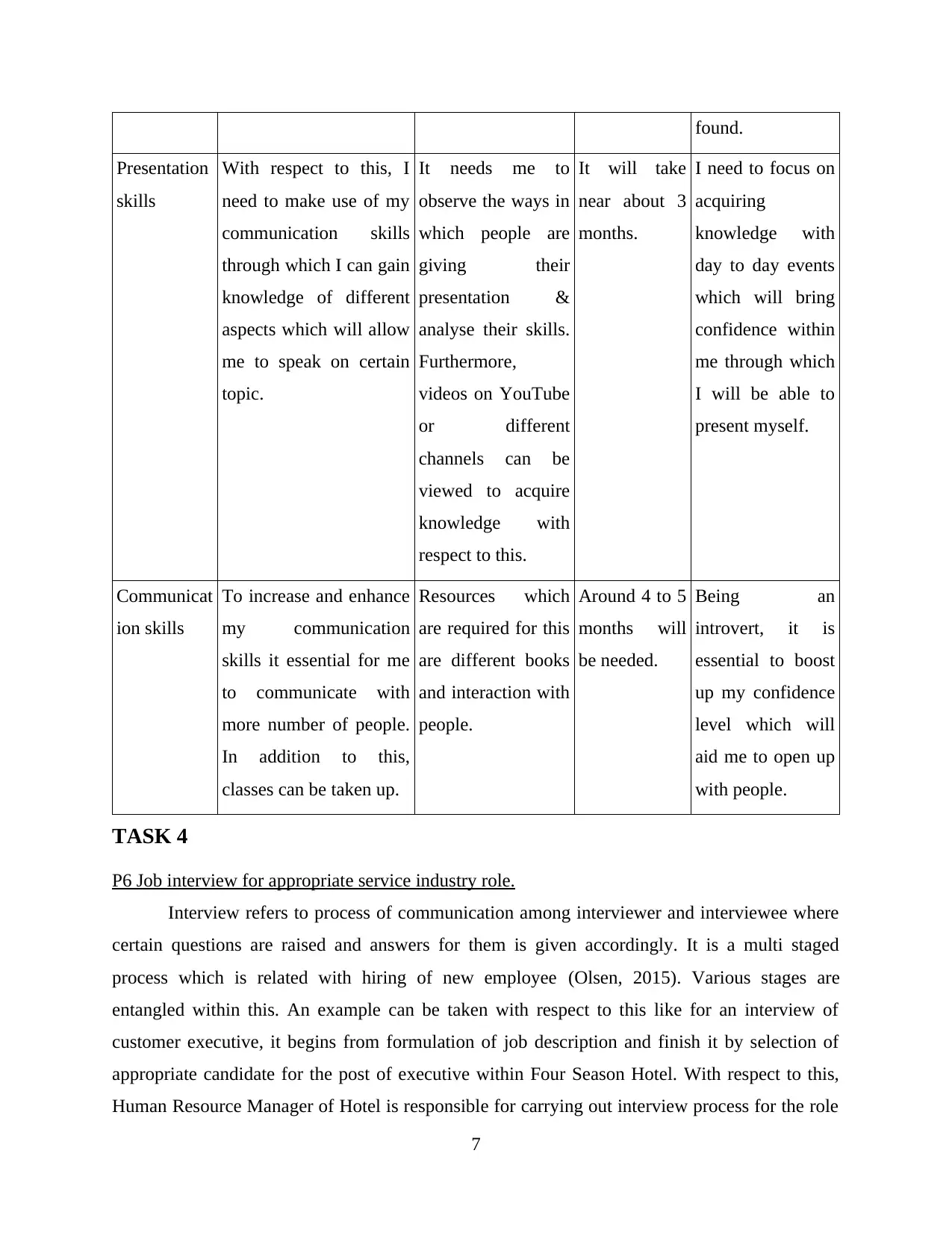
found.
Presentation
skills
With respect to this, I
need to make use of my
communication skills
through which I can gain
knowledge of different
aspects which will allow
me to speak on certain
topic.
It needs me to
observe the ways in
which people are
giving their
presentation &
analyse their skills.
Furthermore,
videos on YouTube
or different
channels can be
viewed to acquire
knowledge with
respect to this.
It will take
near about 3
months.
I need to focus on
acquiring
knowledge with
day to day events
which will bring
confidence within
me through which
I will be able to
present myself.
Communicat
ion skills
To increase and enhance
my communication
skills it essential for me
to communicate with
more number of people.
In addition to this,
classes can be taken up.
Resources which
are required for this
are different books
and interaction with
people.
Around 4 to 5
months will
be needed.
Being an
introvert, it is
essential to boost
up my confidence
level which will
aid me to open up
with people.
TASK 4
P6 Job interview for appropriate service industry role.
Interview refers to process of communication among interviewer and interviewee where
certain questions are raised and answers for them is given accordingly. It is a multi staged
process which is related with hiring of new employee (Olsen, 2015). Various stages are
entangled within this. An example can be taken with respect to this like for an interview of
customer executive, it begins from formulation of job description and finish it by selection of
appropriate candidate for the post of executive within Four Season Hotel. With respect to this,
Human Resource Manager of Hotel is responsible for carrying out interview process for the role
7
Presentation
skills
With respect to this, I
need to make use of my
communication skills
through which I can gain
knowledge of different
aspects which will allow
me to speak on certain
topic.
It needs me to
observe the ways in
which people are
giving their
presentation &
analyse their skills.
Furthermore,
videos on YouTube
or different
channels can be
viewed to acquire
knowledge with
respect to this.
It will take
near about 3
months.
I need to focus on
acquiring
knowledge with
day to day events
which will bring
confidence within
me through which
I will be able to
present myself.
Communicat
ion skills
To increase and enhance
my communication
skills it essential for me
to communicate with
more number of people.
In addition to this,
classes can be taken up.
Resources which
are required for this
are different books
and interaction with
people.
Around 4 to 5
months will
be needed.
Being an
introvert, it is
essential to boost
up my confidence
level which will
aid me to open up
with people.
TASK 4
P6 Job interview for appropriate service industry role.
Interview refers to process of communication among interviewer and interviewee where
certain questions are raised and answers for them is given accordingly. It is a multi staged
process which is related with hiring of new employee (Olsen, 2015). Various stages are
entangled within this. An example can be taken with respect to this like for an interview of
customer executive, it begins from formulation of job description and finish it by selection of
appropriate candidate for the post of executive within Four Season Hotel. With respect to this,
Human Resource Manager of Hotel is responsible for carrying out interview process for the role
7
⊘ This is a preview!⊘
Do you want full access?
Subscribe today to unlock all pages.

Trusted by 1+ million students worldwide
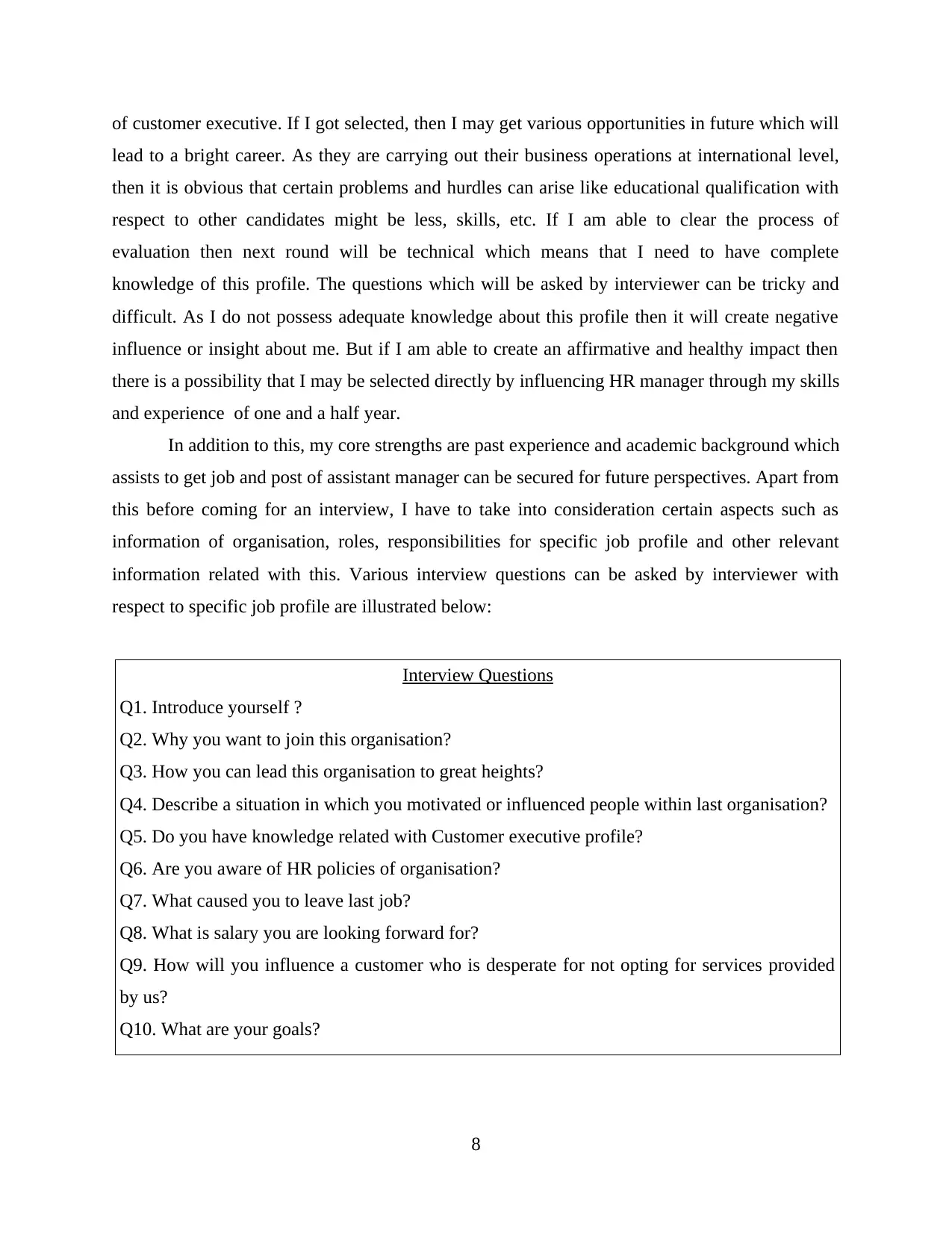
of customer executive. If I got selected, then I may get various opportunities in future which will
lead to a bright career. As they are carrying out their business operations at international level,
then it is obvious that certain problems and hurdles can arise like educational qualification with
respect to other candidates might be less, skills, etc. If I am able to clear the process of
evaluation then next round will be technical which means that I need to have complete
knowledge of this profile. The questions which will be asked by interviewer can be tricky and
difficult. As I do not possess adequate knowledge about this profile then it will create negative
influence or insight about me. But if I am able to create an affirmative and healthy impact then
there is a possibility that I may be selected directly by influencing HR manager through my skills
and experience of one and a half year.
In addition to this, my core strengths are past experience and academic background which
assists to get job and post of assistant manager can be secured for future perspectives. Apart from
this before coming for an interview, I have to take into consideration certain aspects such as
information of organisation, roles, responsibilities for specific job profile and other relevant
information related with this. Various interview questions can be asked by interviewer with
respect to specific job profile are illustrated below:
Interview Questions
Q1. Introduce yourself ?
Q2. Why you want to join this organisation?
Q3. How you can lead this organisation to great heights?
Q4. Describe a situation in which you motivated or influenced people within last organisation?
Q5. Do you have knowledge related with Customer executive profile?
Q6. Are you aware of HR policies of organisation?
Q7. What caused you to leave last job?
Q8. What is salary you are looking forward for?
Q9. How will you influence a customer who is desperate for not opting for services provided
by us?
Q10. What are your goals?
8
lead to a bright career. As they are carrying out their business operations at international level,
then it is obvious that certain problems and hurdles can arise like educational qualification with
respect to other candidates might be less, skills, etc. If I am able to clear the process of
evaluation then next round will be technical which means that I need to have complete
knowledge of this profile. The questions which will be asked by interviewer can be tricky and
difficult. As I do not possess adequate knowledge about this profile then it will create negative
influence or insight about me. But if I am able to create an affirmative and healthy impact then
there is a possibility that I may be selected directly by influencing HR manager through my skills
and experience of one and a half year.
In addition to this, my core strengths are past experience and academic background which
assists to get job and post of assistant manager can be secured for future perspectives. Apart from
this before coming for an interview, I have to take into consideration certain aspects such as
information of organisation, roles, responsibilities for specific job profile and other relevant
information related with this. Various interview questions can be asked by interviewer with
respect to specific job profile are illustrated below:
Interview Questions
Q1. Introduce yourself ?
Q2. Why you want to join this organisation?
Q3. How you can lead this organisation to great heights?
Q4. Describe a situation in which you motivated or influenced people within last organisation?
Q5. Do you have knowledge related with Customer executive profile?
Q6. Are you aware of HR policies of organisation?
Q7. What caused you to leave last job?
Q8. What is salary you are looking forward for?
Q9. How will you influence a customer who is desperate for not opting for services provided
by us?
Q10. What are your goals?
8
Paraphrase This Document
Need a fresh take? Get an instant paraphrase of this document with our AI Paraphraser
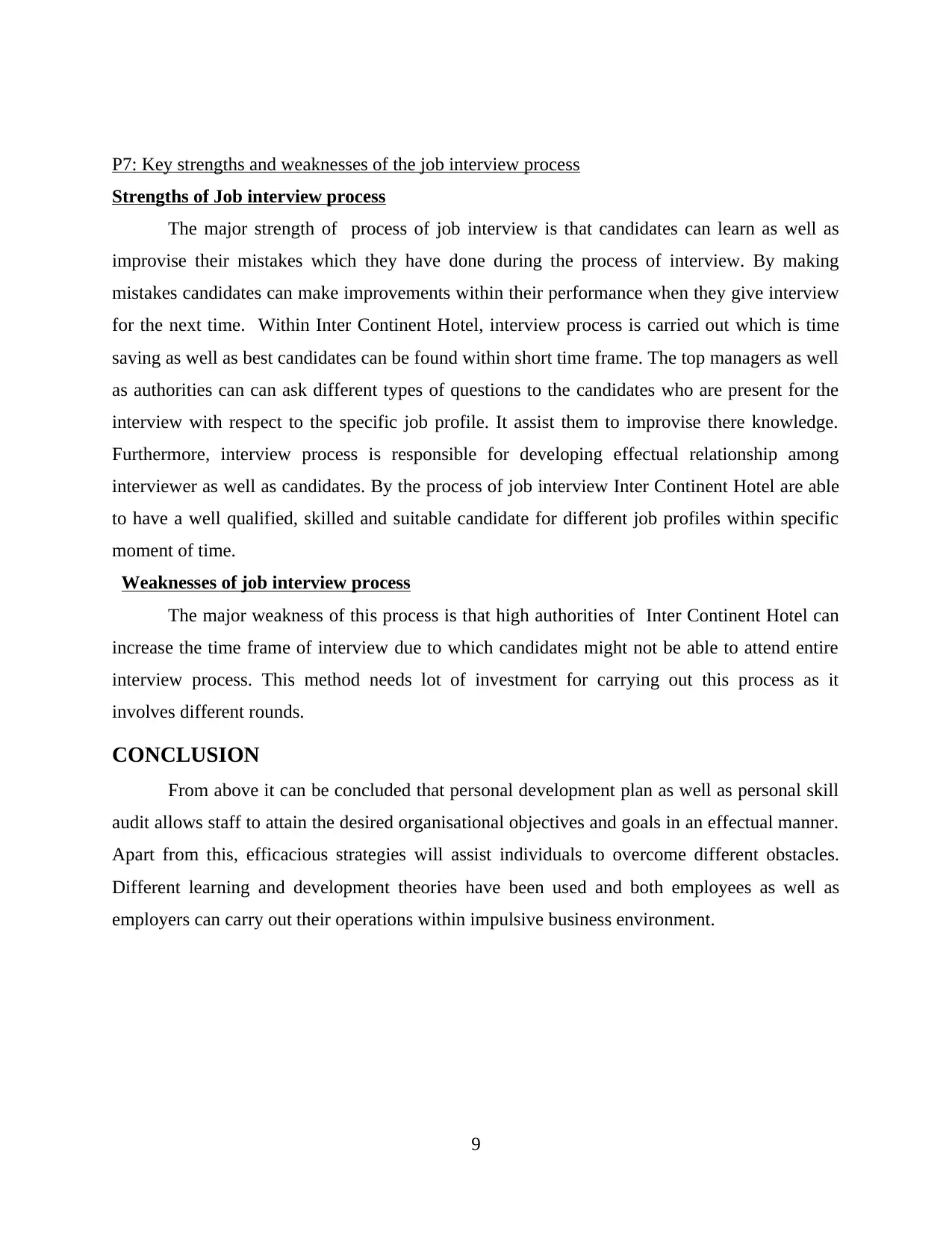
P7: Key strengths and weaknesses of the job interview process
Strengths of Job interview process
The major strength of process of job interview is that candidates can learn as well as
improvise their mistakes which they have done during the process of interview. By making
mistakes candidates can make improvements within their performance when they give interview
for the next time. Within Inter Continent Hotel, interview process is carried out which is time
saving as well as best candidates can be found within short time frame. The top managers as well
as authorities can can ask different types of questions to the candidates who are present for the
interview with respect to the specific job profile. It assist them to improvise there knowledge.
Furthermore, interview process is responsible for developing effectual relationship among
interviewer as well as candidates. By the process of job interview Inter Continent Hotel are able
to have a well qualified, skilled and suitable candidate for different job profiles within specific
moment of time.
Weaknesses of job interview process
The major weakness of this process is that high authorities of Inter Continent Hotel can
increase the time frame of interview due to which candidates might not be able to attend entire
interview process. This method needs lot of investment for carrying out this process as it
involves different rounds.
CONCLUSION
From above it can be concluded that personal development plan as well as personal skill
audit allows staff to attain the desired organisational objectives and goals in an effectual manner.
Apart from this, efficacious strategies will assist individuals to overcome different obstacles.
Different learning and development theories have been used and both employees as well as
employers can carry out their operations within impulsive business environment.
9
Strengths of Job interview process
The major strength of process of job interview is that candidates can learn as well as
improvise their mistakes which they have done during the process of interview. By making
mistakes candidates can make improvements within their performance when they give interview
for the next time. Within Inter Continent Hotel, interview process is carried out which is time
saving as well as best candidates can be found within short time frame. The top managers as well
as authorities can can ask different types of questions to the candidates who are present for the
interview with respect to the specific job profile. It assist them to improvise there knowledge.
Furthermore, interview process is responsible for developing effectual relationship among
interviewer as well as candidates. By the process of job interview Inter Continent Hotel are able
to have a well qualified, skilled and suitable candidate for different job profiles within specific
moment of time.
Weaknesses of job interview process
The major weakness of this process is that high authorities of Inter Continent Hotel can
increase the time frame of interview due to which candidates might not be able to attend entire
interview process. This method needs lot of investment for carrying out this process as it
involves different rounds.
CONCLUSION
From above it can be concluded that personal development plan as well as personal skill
audit allows staff to attain the desired organisational objectives and goals in an effectual manner.
Apart from this, efficacious strategies will assist individuals to overcome different obstacles.
Different learning and development theories have been used and both employees as well as
employers can carry out their operations within impulsive business environment.
9
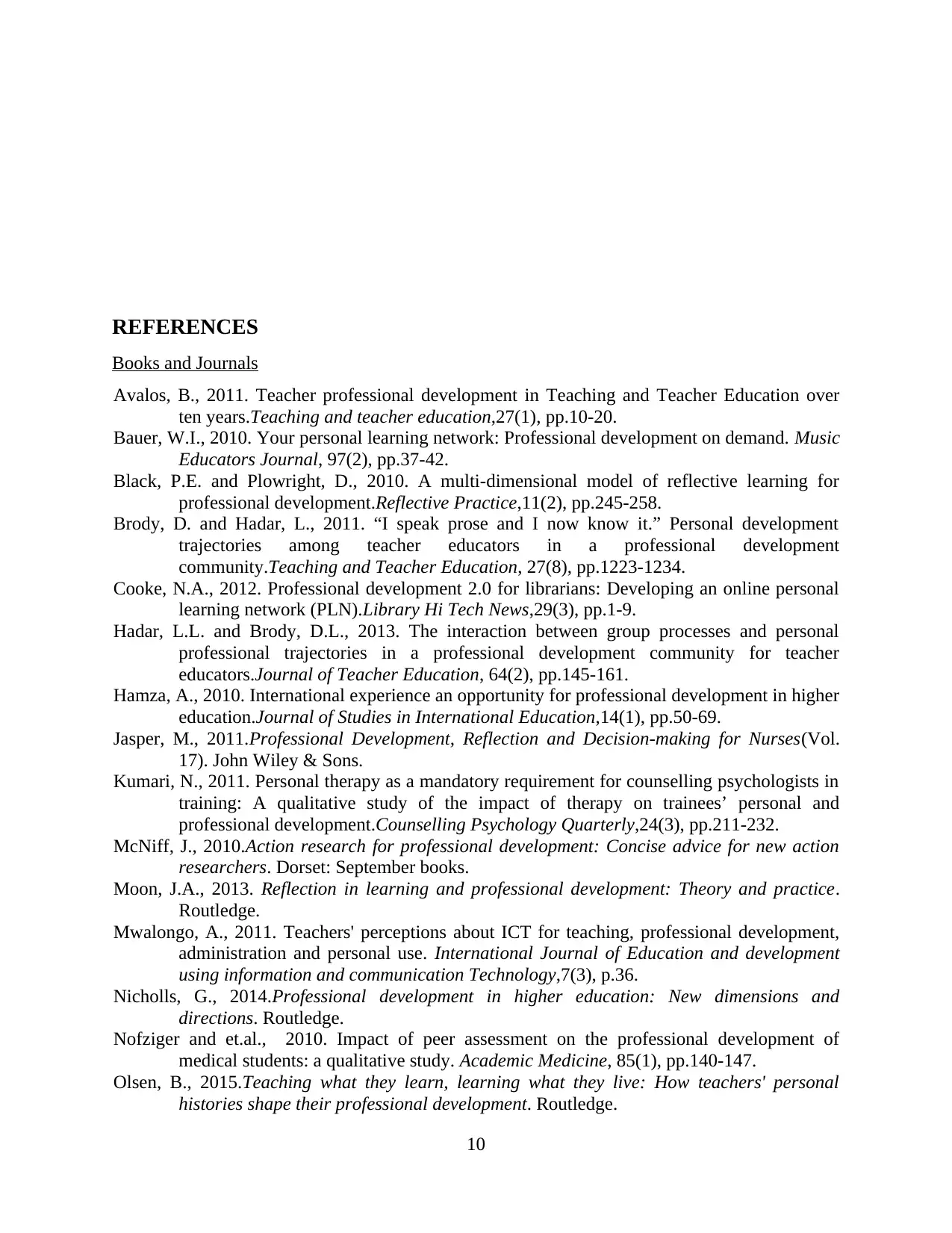
REFERENCES
Books and Journals
Avalos, B., 2011. Teacher professional development in Teaching and Teacher Education over
ten years.Teaching and teacher education,27(1), pp.10-20.
Bauer, W.I., 2010. Your personal learning network: Professional development on demand. Music
Educators Journal, 97(2), pp.37-42.
Black, P.E. and Plowright, D., 2010. A multi‐dimensional model of reflective learning for
professional development.Reflective Practice,11(2), pp.245-258.
Brody, D. and Hadar, L., 2011. “I speak prose and I now know it.” Personal development
trajectories among teacher educators in a professional development
community.Teaching and Teacher Education, 27(8), pp.1223-1234.
Cooke, N.A., 2012. Professional development 2.0 for librarians: Developing an online personal
learning network (PLN).Library Hi Tech News,29(3), pp.1-9.
Hadar, L.L. and Brody, D.L., 2013. The interaction between group processes and personal
professional trajectories in a professional development community for teacher
educators.Journal of Teacher Education, 64(2), pp.145-161.
Hamza, A., 2010. International experience an opportunity for professional development in higher
education.Journal of Studies in International Education,14(1), pp.50-69.
Jasper, M., 2011.Professional Development, Reflection and Decision-making for Nurses(Vol.
17). John Wiley & Sons.
Kumari, N., 2011. Personal therapy as a mandatory requirement for counselling psychologists in
training: A qualitative study of the impact of therapy on trainees’ personal and
professional development.Counselling Psychology Quarterly,24(3), pp.211-232.
McNiff, J., 2010.Action research for professional development: Concise advice for new action
researchers. Dorset: September books.
Moon, J.A., 2013. Reflection in learning and professional development: Theory and practice.
Routledge.
Mwalongo, A., 2011. Teachers' perceptions about ICT for teaching, professional development,
administration and personal use. International Journal of Education and development
using information and communication Technology,7(3), p.36.
Nicholls, G., 2014.Professional development in higher education: New dimensions and
directions. Routledge.
Nofziger and et.al., 2010. Impact of peer assessment on the professional development of
medical students: a qualitative study. Academic Medicine, 85(1), pp.140-147.
Olsen, B., 2015.Teaching what they learn, learning what they live: How teachers' personal
histories shape their professional development. Routledge.
10
Books and Journals
Avalos, B., 2011. Teacher professional development in Teaching and Teacher Education over
ten years.Teaching and teacher education,27(1), pp.10-20.
Bauer, W.I., 2010. Your personal learning network: Professional development on demand. Music
Educators Journal, 97(2), pp.37-42.
Black, P.E. and Plowright, D., 2010. A multi‐dimensional model of reflective learning for
professional development.Reflective Practice,11(2), pp.245-258.
Brody, D. and Hadar, L., 2011. “I speak prose and I now know it.” Personal development
trajectories among teacher educators in a professional development
community.Teaching and Teacher Education, 27(8), pp.1223-1234.
Cooke, N.A., 2012. Professional development 2.0 for librarians: Developing an online personal
learning network (PLN).Library Hi Tech News,29(3), pp.1-9.
Hadar, L.L. and Brody, D.L., 2013. The interaction between group processes and personal
professional trajectories in a professional development community for teacher
educators.Journal of Teacher Education, 64(2), pp.145-161.
Hamza, A., 2010. International experience an opportunity for professional development in higher
education.Journal of Studies in International Education,14(1), pp.50-69.
Jasper, M., 2011.Professional Development, Reflection and Decision-making for Nurses(Vol.
17). John Wiley & Sons.
Kumari, N., 2011. Personal therapy as a mandatory requirement for counselling psychologists in
training: A qualitative study of the impact of therapy on trainees’ personal and
professional development.Counselling Psychology Quarterly,24(3), pp.211-232.
McNiff, J., 2010.Action research for professional development: Concise advice for new action
researchers. Dorset: September books.
Moon, J.A., 2013. Reflection in learning and professional development: Theory and practice.
Routledge.
Mwalongo, A., 2011. Teachers' perceptions about ICT for teaching, professional development,
administration and personal use. International Journal of Education and development
using information and communication Technology,7(3), p.36.
Nicholls, G., 2014.Professional development in higher education: New dimensions and
directions. Routledge.
Nofziger and et.al., 2010. Impact of peer assessment on the professional development of
medical students: a qualitative study. Academic Medicine, 85(1), pp.140-147.
Olsen, B., 2015.Teaching what they learn, learning what they live: How teachers' personal
histories shape their professional development. Routledge.
10
⊘ This is a preview!⊘
Do you want full access?
Subscribe today to unlock all pages.

Trusted by 1+ million students worldwide
1 out of 13
Related Documents
Your All-in-One AI-Powered Toolkit for Academic Success.
+13062052269
info@desklib.com
Available 24*7 on WhatsApp / Email
![[object Object]](/_next/static/media/star-bottom.7253800d.svg)
Unlock your academic potential
Copyright © 2020–2026 A2Z Services. All Rights Reserved. Developed and managed by ZUCOL.




